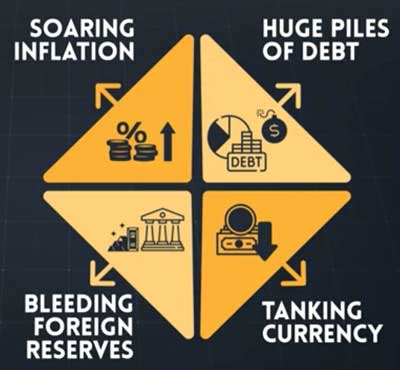Tuesday Feb 17, 2026
Tuesday Feb 17, 2026
Tuesday, 19 April 2022 00:27 - - {{hitsCtrl.values.hits}}
Sri Lanka technically became bankrupt when it announced a temporary suspension of repayment of all external debt of around $ 50 billion, saying the country can no longer honour its commitment owing to weak financial reserves caused by external and internal shocks. This meant the Finance Ministry with a stroke of a pen said goodbye to an outstanding track record of servicing its external debt obligations since independence built by our forefathers. 
Making an announcement is an easy option for a bureaucrat at the Finance Ministry, but the repercussions are significant. This is why the country needs people with a vision and a palpable sense of the future to make decisions for the 22 million people, not retirees waiting to put their legs up. As the FT points out a “negotiated or soft default” is viewed as more respectable as opposed to a disastrous “hard default”. But surely, given that the immediate need was $ 70+ million, could we not have waited until we had negotiated a deal with the IMF to do it? Certainly there were better options in the short term.
Was Parliament consulted before such a serious and momentous decision was taken? The earlier arbitrary decision to float the LKR, pushed the Rupee down by 50% to Rs. 320 against the US Dollar. Ironically, the exporters have not gained significantly, the depreciating rupee has significantly increased the production costs of manufacturing and there has been a big drop in production. The forex situation is certainly out of control. Sri Lanka needs to manage the huge spikes in the exchange rate. Today the LKR is the world’s worst-performing currency, further aggravating the ongoing forex crisis. Unfortunately, most of the people who created this mayhem are yet in the saddle and playing with the economy with their limited knowledge and experience.
The men who created the mess disappeared long before the dirt hit the fan for others to take the rap. An independent presidential commission is a must in the future to investigate this debacle and those responsible must be called out in public. Also we must ensure that the institutional safeguards are back in place to prevent anymore one man shows. Today, 99% of the Sri Lankan public have become poorer because the crisis was mismanaged, despite several red flags being raised to those concerned by several experts.

Implications for banks
With the announcement, Standard and Poor immediately downgraded Sri Lanka to “CC” from “CCC” and said a selective default (SD) rating is likely to be given once actual non-payment of foreign debt kicks in. There was no one this time in the Government to say the announcement was unfair, ill thought of, biased and all the expletives. Based on professional estimates, the country needs $ 4.5 billion foreign currency injection from outside for the economy to survive in 2022. According to sources, India, the World Bank and the ADB are willing to commit up to another $ 2 billion in financial assistance to Sri Lanka while also supporting issues of food and energy security for the population. Sri Lanka is certainly looking down the barrel of the gun, with inflation running over 30%, debt defaults, a depreciating currency and limited forex inflows to import essentials.
The banks too are facing the mother of all crises with very likely being forced to take a capital haircut on the ISBs (and possibly the TB holdings) and forex impairments on the USD loan books. Capital augmentation would be a challenge at best in today’s environment. Bank customers need to be shielded from the excesses of the banks’ management and incompetent boards. Legislation along the line of the Did-Frank Act and the Volker Rule needs to be introduced to ring fence banks customer’s hard-earned savings. Super profits for banks will have to be a thing of the past. Banks will require boards with a deep understanding of banking to manage what is in store for them. A system overhaul is required to strengthen the banks. With an IMF bailout package still a distance away, the Government will have to look for short-term options.
In addition to all these issues, political instability is hurting tourism and FDI. All this can be turned around by putting the right people in the right place. It is time for the Rajapaksa family to do the right thing by the country to resolve this crisis.
Way forward
Arjuna Ranawana in his EconomyNext column says, “If Parliament responds genuinely to the cry of the people, defeats the Government on the floor of the House and then repealed the laws that give the Presidency unlimited power, then this moment in time will end well for the good of the people. One must also hope that, in such an event, those who rise to lead the country, have a firm, clear and transparent plan. If the Rajapaksas dig in their heels and unleash their goons, or worse, use State power to repress the protests, the result will be ugly, and Sri Lanka will descend into chaos or worse.”
These words need to be taken seriously. The Opposition must forget their differences, stop fighting for their pound of flesh, and unite to bring some order back to the country and to manage the pain the public will have to endure in an IMF bailout. If not those budding kings will have no country to rule, leave alone a political party to lead. So please don’t leave it to God to save Sri Lanka.